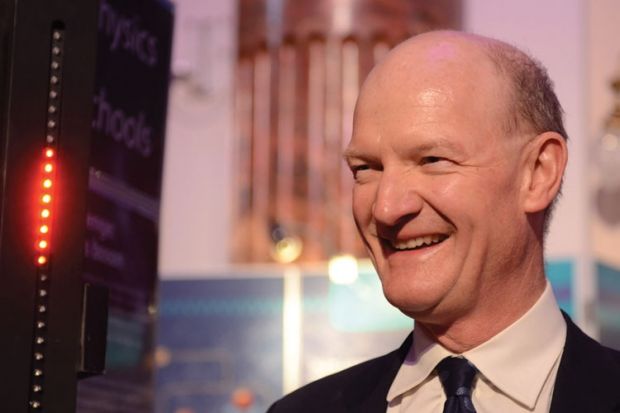When David Willetts stepped down as minister for universities and science, we took to our Twitter account (@timeshighered) to ask what you thought he would be remembered for.
We created the hashtag #WillettsLegacy to group all your appraisals together, and hundreds of tweets were sent in the first three days following the minister’s departure.
Tom Youngman (@tmyoungman), ethics and environment officer at University College London’s Students’ Union, described #WillettsLegacy as “crippling debt, marketisation, managerialisation, the crushing of the soul of the university” – a view that David Price (@DavidPriceUCL), UCL professor of mineral physics and vice-provost (research), dismissed as “rubbish”. “My £50K debt says otherwise,” replied Mr Youngman.
Lee Jones (@DrLeeJones), senior lecturer in international politics at Queen Mary University of London, pointed to “vastly accelerated marketisation, £9K fees, consumerism rampant & the beginning of the end for many HE depts and some HEIs”, while Dan Sam (@DanSam1) said that Mr Willetts would be known for “acknowledging the importance of internationalisation but then chickening out” to home secretary Theresa May and immigration minister James Brokenshire on disagreements over student visa rules.
The criticisms kept coming. John Canning (@johngcanning), senior lecturer at the Centre for Learning and Teaching, University of Brighton, said the former minister “saw how young people were being robbed by previous generations then robbed…some more”, and Ryan Kemp (@RyanKemp1992), a postgraduate student at the University of Oxford, blamed Mr Willetts for a “fees system failing students, taxpayers and universities but saddling the former with debt which could be privatised” and a “complete cut of master’s scholarships making it near impossible to begin a humanities course without £20,000 cash upfront”.
There was praise too, however. Matthew Barrow (@wheelybarrow), executive officer for learning and teaching enhancement at the University of Bath, tweeted that while he “didn’t always agree with Willetts…far darker, right-wing ideology lies amongst Tory backbenchers”. Cara Aitchison (@MarjonVC), vice-chancellor of the University of St Mark and St John, thanked the former minister for making it possible for institutions with fewer than 4,000 students to become universities.
David Prosser (@RLUK_David), executive director of Research Libraries UK, praised Mr Willetts’ “strong personal support for Open Access in the UK”, although he had “quibbles with all aspects of implementation”, and Joseph Clift (@josephclift), a former policy manager at the British Heart Foundation, recalled the “science cash freeze at a time large cuts were being mooted”.
Others were less serious. Christopher Pittard (@CAPittard), senior lecturer in English literature at the University of Portsmouth, said his “only disappointment is that I will no longer be able to use the ‘What you talking ’bout Willetts?’ line”, a reference to a catchphrase used in the 1980s US sitcom Diff’rent Strokes (“What you talkin’ ’bout, Willis?”). Peter Coles (@telescoper) said that he would “never forget him for the fact that his name means ‘tits’ in Polari”, a form of cant slang historically used in Britain in gay subculture, and by actors, Travellers, criminals and prostitutes.
Send links to topical, insightful and quirky online comment by and about academics to chris.parr@tsleducation.com
Register to continue
Why register?
- Registration is free and only takes a moment
- Once registered, you can read 3 articles a month
- Sign up for our newsletter
Subscribe
Or subscribe for unlimited access to:
- Unlimited access to news, views, insights & reviews
- Digital editions
- Digital access to THE’s university and college rankings analysis
Already registered or a current subscriber? Login

